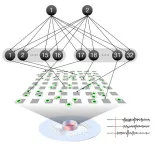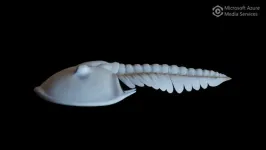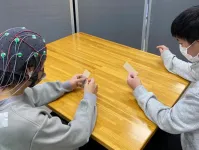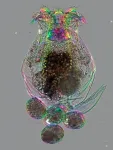(Press-News.org) Depression and anxiety are thought to increase a person’s risk of developing cancer, but research results have been inconclusive. In an analysis of multiple studies from the Netherlands, the United Kingdom, Norway, and Canada, investigators found that depression and anxiety are not linked to higher risks for most types of cancer among this population. The analysis is published by Wiley online in CANCER, a peer-reviewed journal of the American Cancer Society.
Experts have suspected that depression and anxiety may increase cancer risk by affecting a person’s health-related behaviors or by having biological effects on the body that support cancer development. Some research has supported an association between depression, anxiety, and cancer incidence, while other investigations have found no or negligible associations.
To provide additional insights, Lonneke A. van Tuijl, PhD, of the University Medical Center Groningen, and her colleagues examined data from the international Psychosocial Factors and Cancer Incidence consortium, which includes information from 18 prospective study groups with more than 300,000 adults from the Netherlands, the United Kingdom, Norway, and Canada.
The team found no associations between depression or anxiety and overall, breast, prostate, colorectal, and alcohol-related cancers during a follow-up of up to 26 years. The presence of depression or anxiety was linked with a 6% higher risk of developing lung cancer and smoking-related cancers, but this risk was substantially reduced after adjusting for other cancer-related risk factors including smoking, alcohol use, and body mass index. Therefore, this analysis supports the importance of addressing tobacco smoking and other unhealthy behaviors including those that may develop as a result of anxiety or depression.
“Our results may come as a relief to many patients with cancer who believe their diagnosis is attributed to previous anxiety or depression,” said Dr. van Tuijl. “However, further research is needed to understand exactly how depression, anxiety, health behaviors, and lung cancer are related.”
Additional information
NOTE: The information contained in this release is protected by copyright. Please include journal attribution in all coverage. A free abstract of this article will be available via the CANCER Newsroom upon online publication. For more information or to obtain a PDF of any study, please contact: Sara Henning-Stout, newsroom@wiley.com
Full Citation:
“Depression, anxiety, and the risk of cancer: An individual participant data meta-analysis.” Lonneke A. van Tuijl, Maartje Basten, Kuan-Yu Pan, Roel Vermeulen, Lützen Portengen, Alexander de Graeff, Joost Dekker, Mirjam I. Geerlings, Adriaan Hoogendoorn, Femke Lamers, Adri C. Voogd, Jessica Abell, Philip Awadalla, Aartjan T. F. Beekman, Ottar Bjerkeset, Andy Boyd, Yunsong Cui, Philipp Frank, Henrike Galenkamp, Bert Garssen, Sean Hellingman, Martijn Huisman, Anke Huss, Trynke R. de Jong, Melanie R. Keats, Almar A. L. Kok, Steinar Krokstad, Flora E. van Leeuwen, Annemarie I. Luik, Nolwenn Noisel, N. Charlotte Onland-Moret, Yves Payette, Brenda W. J. H. Penninx, Ina Rissanen, Annelieke M. Roest, Rikje Ruiter, Robert A. Schoevers, David Soave, Mandy Spaan, Andrew Steptoe, Karien Stronks, Erik R. Sund, Ellen Sweeney, Emma L. Twait, Alison Teyhan, W. M. Monique Verschuren, Kimberly D. van der Willik, Judith G. M. Rosmalen, and Adelita V. Ranchor. CANCER; Published Online: August 7, 2023 (DOI: 10.1002/cncr.34853).
URL Upon Publication: http://doi.wiley.com/10.1002/cncr.34853
Author Contact: Lex Kloosterman or Joost Wessels at +31503612200
About the Journal
CANCER is a peer-reviewed publication of the American Cancer Society integrating scientific information from worldwide sources for all oncologic specialties. The objective of CANCER is to provide an interdisciplinary forum for the exchange of information among oncologic disciplines concerned with the etiology, course, and treatment of human cancer. CANCER is published on behalf of the American Cancer Society by Wiley and can be accessed online. Follow CANCER on Twitter @JournalCancer and Instagram @ACSJournalCancer, and stay up to date with the American Cancer Society Journals on LinkedIn.
About Wiley
Wiley is a knowledge company and a global leader in research, publishing, and knowledge solutions. Dedicated to the creation and application of knowledge, Wiley serves the world’s researchers, learners, innovators, and leaders, helping them achieve their goals and solve the world's most important challenges. For more than two centuries, Wiley has been delivering on its timeless mission to unlock human potential. Visit us at Wiley.com. Follow us on Facebook, Twitter, LinkedIn and Instagram.
END
Robust analysis challenges theory that depression and anxiety increase cancer risk
Robust analysis challenges theory that depression and anxiety increase cancer risk.
2023-08-07
ELSE PRESS RELEASES FROM THIS DATE:
Mathematical theory predicts self-organized learning in real neurons
2023-08-07
An international collaboration between researchers at the RIKEN Center for Brain Science (CBS) in Japan, the University of Tokyo, and University College London has demonstrated that self-organization of neurons as they “learn” follows a mathematical theory called the free energy principle. The principle accurately predicted how real neural networks spontaneously reorganize to distinguish incoming information, as well as how altering neural excitability can disrupt the process. The findings thus have implications for building animal-like artificial intelligences and for understanding cases of impaired learning. The study was published August 7 in Nature Communications.
When we ...
Survey of CVD programs finds more resources needed for heart disease and stroke risk in youth
2023-08-07
Advisory Highlights:
Risk factors for cardiovascular disease are common among preteens and teens, and the need for preventive care to reduce their risk of cardiovascular disease exceeds the supply of health care resources, according to a new American Heart Association science advisory that reports survey results from pediatric cardiovascular health professionals.
Current data show that 39% of U.S. youth ages 12-19 meet criteria for obesity or overweight, 53% have high cholesterol, 18% with prediabetes and 15% have high blood pressure.
The advisory identifies the need for clinical practice guidelines, collaboration ...
A wake-up call for kids’ poor heart health
2023-08-07
‘We’re not talking about primordial prevention. They’re already at risk for having an early heart attack or stroke’
First comprehensive study in 30 years to examine pediatric preventive cardiology in the U.S., Canada
Heart disease is the leading cause of death in U.S. adults
CHICAGO --- Today in the U.S., a child with risk factors for heart disease (high blood pressure, overweight, etc.) can wait close to a year to see a cardiologist because of high demand and limited resources. This is precious time that could be spent managing ...
The trilobites’ guide to surviving environmental change
2023-08-07
Scientists have worked out how one unusual species of trilobite — an ancient, sea-dwelling relative of spiders and lobsters — was able to defend itself against predators and survive a bumpy ride as Earth’s oxygen levels fluctuated.
The seas were filled with trilobites for nearly 300 million years starting in the Cambrian Period, some 520 million years ago. During their time on Earth, which lasted much longer than the dinosaurs, they survived two major episodes of mass extinctions and dominated ocean floor ecosystems.
Their ...
Sports media use linked to belief in rape myths
2023-08-07
PULLMAN, Wash. – Young men in a recent study who were regular consumers of sports media were more likely to accept rape myths, a set of false and prejudiced beliefs that can serve to excuse or downplay sexual assault.
This connection held even after accounting for participants who believed in certain negative “masculine norms,” namely that men should control women or they should be sexually permissive and try to have sex with as many women as possible.
“Sports media exposure had a unique contribution, and it was significant,” said Stacey Hust, a professor at Washington State University’s Murrow College of Communication and the study’s ...
Your presence matters: parallel group craft activities proven effective in occupational therapy
2023-08-07
Osaka, Japan – “Your presence means the world to me” may sound like a wedding invitation cliché, but an Osaka Metropolitan University study has shown that the presence of others while working does generate a state of relaxation and positive brain activity.
In psychiatry, occupational therapy encompasses not only the individual-therapist relationship but also occupational activities and group work. In clinical practice, having multiple individuals engage in separate activities within the same room has been deemed effective as part of occupational therapy. ...
Go with the flow
2023-08-06
The antibiotic cefazolin is an essential drug according to the World Health Organization (WHO). It is usually produced via batch manufacturing, but this multistep process is time-consuming, wasteful and requires very specialized facilities. Now for the first-time, researchers have manufactured cefazolin using the continuous-flow method. This method is cheaper, quicker, less wasteful and more flexible in terms of how much drug can be produced when it’s needed. Improving access to cefazolin is vital for global health and particularly relevant for countries such as Japan, which experienced a shortage in 2019. This study is published in the Bulletin ...
AI transformation of medicine: Why doctors are not prepared
2023-08-05
BALTIMORE, August 5, 2023–As artificial intelligence systems like ChatGPT find their way into everyday use, physicians will start to see these tools incorporated into their clinical practice to help them make important decisions on diagnosis and treatment of common medical conditions. These tools, called clinical decision support (CDS) algorithms, can be enormously helpful in helping guide health care providers in determining, for example, which antibiotics to prescribe or whether to recommend a risky heart surgery.
The success of these new technologies, however, depends largely on how physicians interpret and act upon a tool’s ...
We’re closer to engineering blood vessels
2023-08-05
University of Melbourne researchers have developed a fast, inexpensive and scalable method for engineering blood vessels from natural tissue.
Co-led by ARC Future Fellow Associate Professor Daniel Heath and Redmond Barry Distinguished Professor and Shanahan Chair in Frontier Medical Solutions Andrea O’Connor, both from the Department of Biomedical Engineering, the researchers employed a novel approach to ‘tissue engineering’ blood vessels.
By combining multiple materials and fabrication technologies, they developed a method to create blood vessels with complex geometries like native blood ...
Powerful gene editing approach boosts rotifers in pantheon of laboratory animals
2023-08-04
By Wynne Parry
Much about tiny, swimming rotifers makes them ideal study subjects. Although barely visible to the naked eye, these transparent animals and their innards are readily viewed under a microscope. What’s more, they grow readily in laboratory culture, offering scientists an otherwise difficult-to-obtain perspective from their corner of the animal kingdom.
However, while rotifers have been used experimentally for more than a century by many research groups, scientists have so far lacked the ability to readily manipulate rotifers’ genetics, placing a hard limit on the experiments they can run with these animals.
A joint ...
LAST 30 PRESS RELEASES:
Children born with upper limb difference show the incredible adaptability of the young brain
How bacteria can reclaim lost energy, nutrients, and clean water from wastewater
Fast-paced lives demand faster vision: ecology shapes how “quickly” animals see time
Global warming and heat stress risk close in on the Tour de France
New technology reveals hidden DNA scaffolding built before life ‘switches on’
New study reveals early healthy eating shapes lifelong brain health
Trashing cancer’s ‘undruggable’ proteins
Industrial research labs were invented in Europe but made the U.S. a tech superpower
Enzymes work as Maxwell's demon by using memory stored as motion
Methane’s missing emissions: The underestimated impact of small sources
Beating cancer by eating cancer
How sleep disruption impairs social memory: Oxytocin circuits reveal mechanisms and therapeutic opportunities
Natural compound from pomegranate leaves disrupts disease-causing amyloid
A depression treatment that once took eight weeks may work just as well in one
New study calls for personalized, tiered approach to postpartum care
The hidden breath of cities: Why we need to look closer at public fountains
Rewetting peatlands could unlock more effective carbon removal using biochar
Microplastics discovered in prostate tumors
ACES marks 150 years of the Morrow Plots, our nation's oldest research field
Physicists open door to future, hyper-efficient ‘orbitronic’ devices
$80 million supports research into exceptional longevity
Why the planet doesn’t dry out together: scientists solve a global climate puzzle
Global greening: The Earth’s green wave is shifting
You don't need to be very altruistic to stop an epidemic
Signs on Stone Age objects: Precursor to written language dates back 40,000 years
MIT study reveals climatic fingerprints of wildfires and volcanic eruptions
A shift from the sandlot to the travel team for youth sports
Hair-width LEDs could replace lasers
The hidden infections that refuse to go away: how household practices can stop deadly diseases
Ochsner MD Anderson uses groundbreaking TIL therapy to treat advanced melanoma in adults
[Press-News.org] Robust analysis challenges theory that depression and anxiety increase cancer riskRobust analysis challenges theory that depression and anxiety increase cancer risk.





